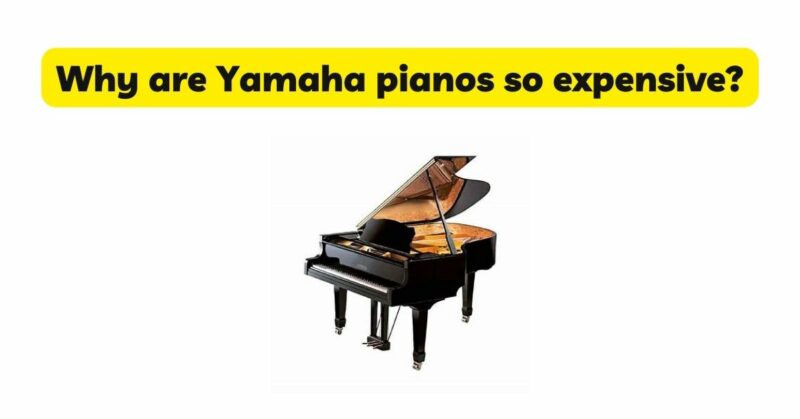Yamaha is a brand synonymous with excellence in the world of pianos. Renowned for their craftsmanship, innovation, and commitment to quality, Yamaha pianos often come with a higher price tag compared to other brands. This article aims to explore the factors that contribute to the higher cost of Yamaha pianos, shedding light on the brand’s reputation, meticulous manufacturing processes, quality materials, technological advancements, and the value they offer to musicians. By understanding the reasons behind the higher price of Yamaha pianos, we can appreciate the expertise and dedication that goes into creating these exceptional instruments.
- Brand Reputation and Heritage:
Yamaha has built a strong reputation as a leading piano manufacturer, known for their commitment to quality and innovation. With over a century of experience in piano craftsmanship, the brand has gained the trust and recognition of musicians and enthusiasts worldwide. The long-standing heritage and reputation of Yamaha contribute to the higher price of their pianos, as customers are willing to pay a premium for the brand’s legacy and expertise.
- Craftsmanship and Manufacturing Processes:
Yamaha pianos are crafted with meticulous attention to detail and undergo rigorous manufacturing processes. Skilled artisans and technicians dedicate countless hours to handcrafting and assembling each piano, ensuring the highest level of precision and quality. Yamaha’s commitment to maintaining traditional craftsmanship techniques while incorporating modern manufacturing methods results in pianos of exceptional quality and longevity. The labor-intensive nature of the manufacturing process contributes to the higher price of Yamaha pianos.
- Research and Development:
Yamaha’s commitment to innovation and continuous improvement drives their investment in research and development. The brand is dedicated to enhancing the sound, touch, and overall performance of their pianos. Extensive research and testing are conducted to refine their piano designs, materials, and manufacturing techniques. The substantial investment in research and development adds to the overall cost of Yamaha pianos, as the brand strives to offer instruments that deliver unparalleled musical experiences.
- Quality Materials:
Yamaha utilizes high-quality materials in the construction of their pianos, contributing to their superior sound and durability. Premium woods, such as spruce for soundboards and fine-grained hardwoods for the piano case, are carefully selected for their tonal properties and aesthetics. The use of quality materials ensures the longevity and performance of Yamaha pianos. However, these premium materials come at a higher cost, contributing to the overall price of the instruments.
- Technological Advancements:
Yamaha has been at the forefront of incorporating technological advancements into their pianos. They have pioneered innovations such as the use of synthetic materials for key actions, advanced sound sampling technology, and digital enhancements in their hybrid pianos. These technological advancements aim to enhance the playing experience, expand the capabilities of the instrument, and provide a broader range of expressive possibilities. The integration of these technologies adds value to Yamaha pianos but also contributes to their higher cost.
- Range of Models and Options:
Yamaha offers a wide range of piano models to cater to the diverse needs and preferences of musicians. From entry-level upright pianos to concert grand pianos, Yamaha provides instruments for various skill levels and performance settings. The range of models and options available allows musicians to select a Yamaha piano that best suits their specific requirements. However, the availability of a wide range of models and customization options can contribute to variations in pricing, with more advanced and specialized models commanding higher prices.
- Resale Value and Investment:
Yamaha pianos are known for their exceptional resale value, which is a testament to their enduring quality and desirability in the market. The brand’s reputation, craftsmanship, and attention to detail ensure that Yamaha pianos retain their value over time. This aspect adds to the initial cost of purchasing a Yamaha piano, as it is considered a long-term investment that can provide returns in the future.
Conclusion:
The higher price of Yamaha pianos can be attributed to various factors, including the brand’s reputation, meticulous craftsmanship, research and development, use of quality materials, technological advancements, range of models, and their enduring resale value. Yamaha’s commitment to delivering exceptional instruments and their continuous drive for innovation contribute to the higher cost of their pianos. While the price may be a significant consideration, it is important to recognize the value that Yamaha pianos offer in terms of craftsmanship, sound quality, durability, and long-term investment potential. By understanding the factors behind the higher cost of Yamaha pianos, musicians can make an informed decision and appreciate the unparalleled musical experiences that these exceptional instruments provide.


